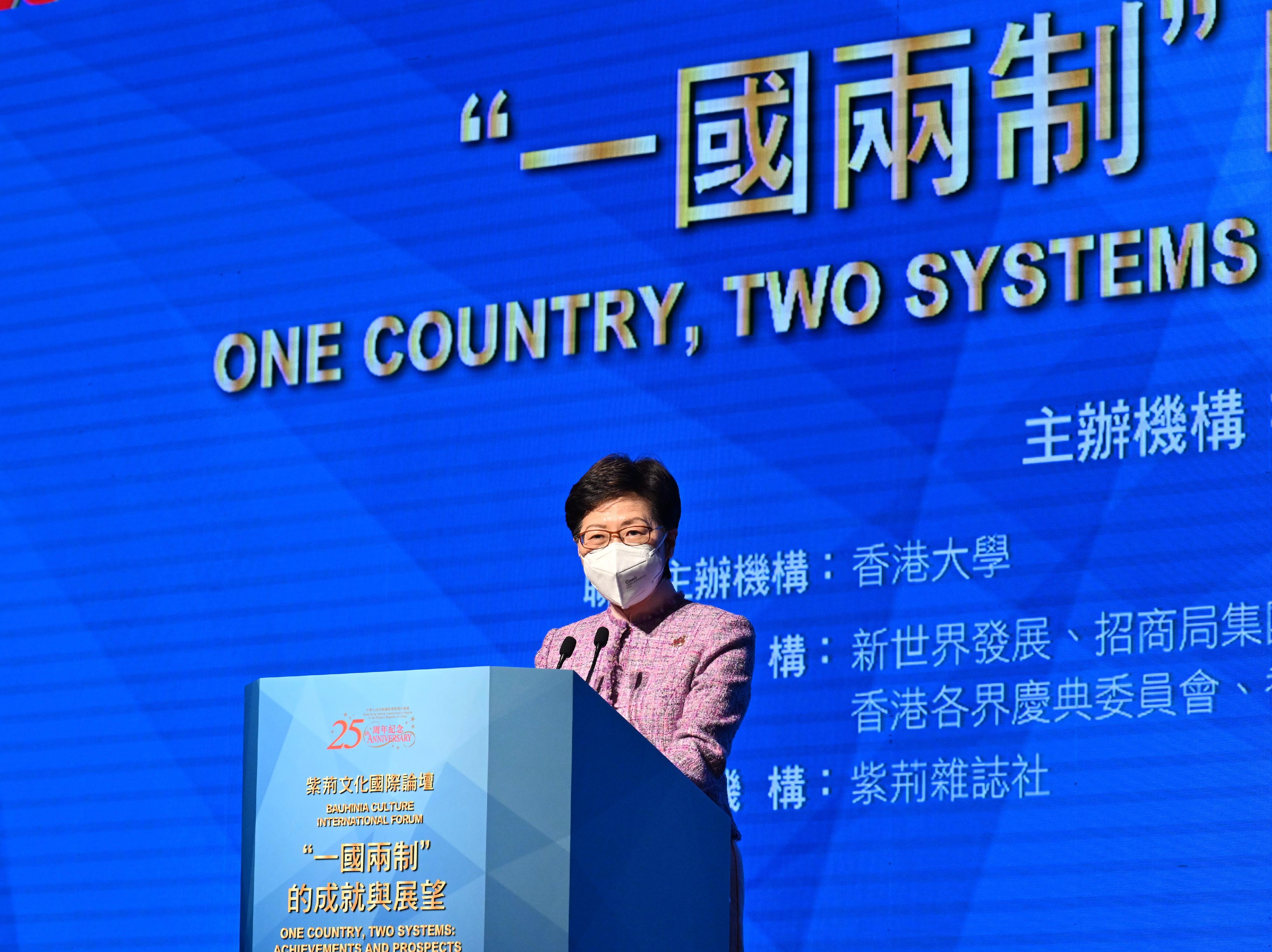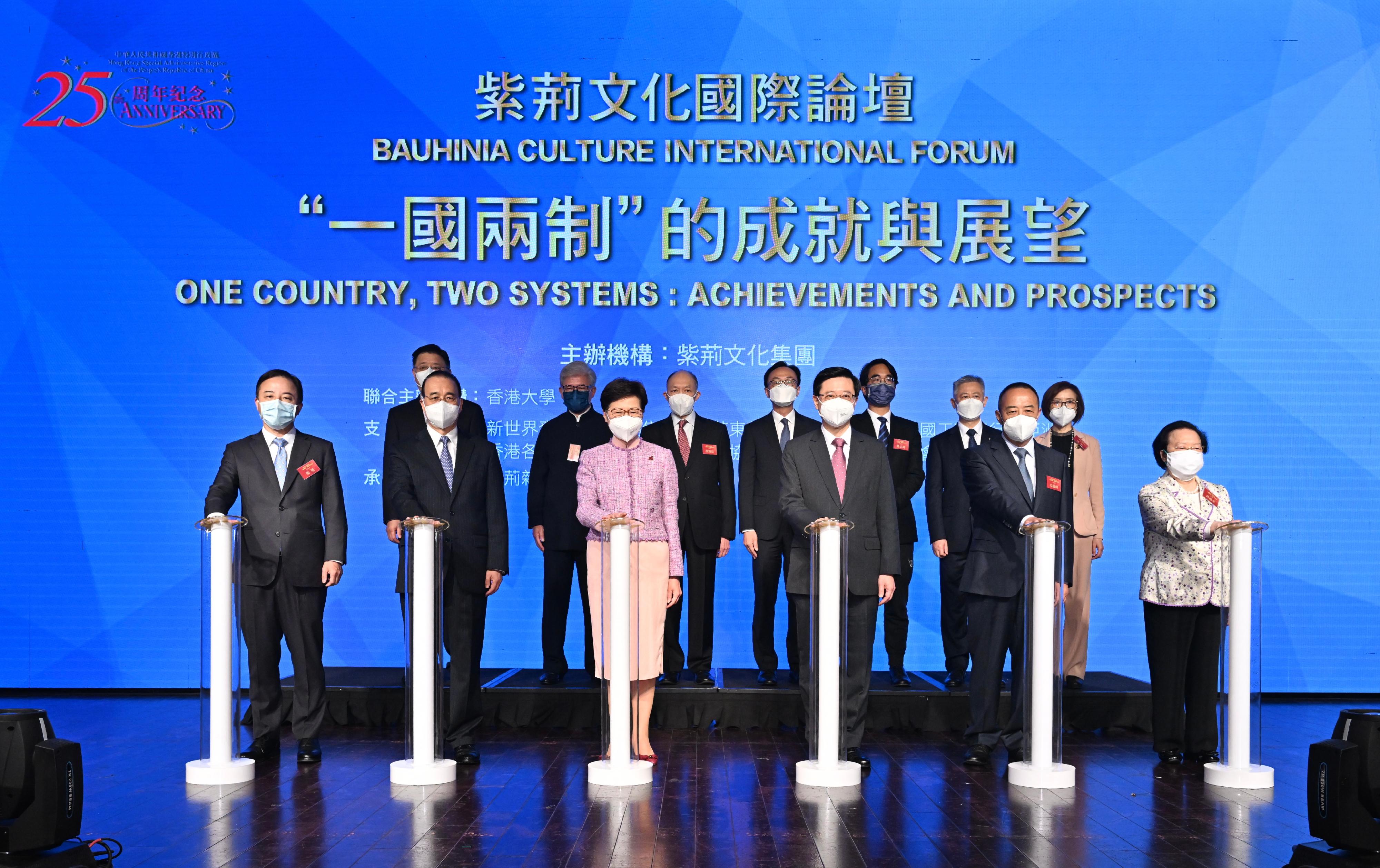Speech by CE at Bauhinia Culture International Forum (English only) (with photos/video)
***************************************************************************************
Commissioner Liu (Commissioner of the Ministry of Foreign Affairs of the People's Republic of China in the Hong Kong Special Administrative Region, Mr Liu Guangyuan), Mr Lee (Chief Executive-elect, Mr John Lee), Mr Mao (Chairman of Bauhinia Culture Holdings Limited, Mr Mao Chaofeng), distinguished speakers, guests, ladies and gentlemen,
Good morning. It really gives me great pleasure to speak to you all at the Bauhinia Culture International Forum. As the 25th anniversary of the establishment of the Hong Kong Special Administrative Region (HKSAR) draws near, this is an opportune occasion to celebrate the remarkable achievements of the "One Country, Two Systems" principle over the past quarter century. It is also a good time to envision Hong Kong's promising future leveraging this unique arrangement, particularly with what our city has gone through in the past several years. I would therefore wish to, first of all, thank the Bauhinia Culture Group for organising this very meaningful event.
Looking back to July 1, 1997, Hong Kong's return to the motherland together with the establishment of the HKSAR was a monumental achievement. Everyone was anxious to see how this pioneering and unprecedented concept of "One Country, Two Systems" was to unfold, and whether Hong Kong would continue to shine as an international city. In terms of maintaining stability and prosperity and executing a high degree of autonomy, the practice of "One Country, Two Systems" in Hong Kong is indisputably a success story.
Thanks to the strong support of the motherland and Hong Kong people's resilience and innovative spirit, Hong Kong has emerged as Asia's World City. Hong Kong remains one of the world's freest and most competitive economies, the world's No. 3 global financial centre, the world's No. 3 destination for foreign direct investment, and is the world's largest offshore RMB hub, busiest air cargo hub, seventh largest stock market, fourth largest international maritime centre and sixth largest merchandise trade centre. Over 9 000 overseas and Mainland companies have set up their business operations in Hong Kong. "One Country, Two Systems", as a strong governance system, has stood the test of time and overcome multiple challenges, but it is not all smooth sailing.
As President Xi Jinping reminded us in his keynote address made in Hong Kong five years ago, "One Country, Two Systems" is a pioneering initiative that has no precedent to follow. Its application entails an evolving process and we will encounter new developments and new issues as we move along. In the early days, we weathered the 1997 Asian financial crisis, the 2003 SARS outbreak, the 2008 global financial tsunami, the 2012 protest against national education, the 2014 Occupy Movement, and the anti-China and destabilising activities in the Legislative Council following the 2016 elections, leading right up to the violence and riots in 2019 undermining national security. I and my Government were facing some unprecedented challenges which could derail "One Country, Two Systems" and paralyse the Government. It was only with the timely intervention by the Central Government that a number of concrete actions were taken at the constitutional level to save the day.
Within a year, the Standing Committee of the National People's Congress (NPC) exercised its power conferred by the Constitution of the People's Republic of China and enacted the National Security Law. The new law effectively plugs the loopholes in Hong Kong's security regime and gives us the essential systems to uphold national security. This was followed by the NPC's decision to improve the electoral system of the HKSAR which provides a robust systemic safeguard for "patriots administering Hong Kong". I am pleased to oversee the smooth conclusion of the three major elections held successively under the improved electoral system. These two key measures have laid a solid foundation for the continuous and faithful implementation of "One Country, Two Systems". After some 25 years, Hong Kong is finally back to the right track and could now advance forward.
Looking back to what this term of Government has achieved, I would like to say that Hong Kong is entering a new era of stability, prosperity and opportunity - echoing the slogan of our 25th anniversary celebrations. As I am about to pass the baton to my successor, let us take comfort that the future Hong Kong:
- Is politically more stable due to the two significant Central Government initiatives I just mentioned, and I am sure some of the distinguished speakers will have more to say on this aspect;
- Is economically more solid with the Central Government's support in the 14th Five-Year Plan to develop not only an international financial, transportation and trade centre, but also meet Hong Kong's aspirations to become an international innovation and technology centre, an international aviation hub and an East-meets-West cultural hub;
- Is culturally more diverse with the West Kowloon Cultural District featuring two world-class museums, namely M+ and the Hong Kong Palace Museum, a flourishing art scene, and being the world's No. 2 art trading hub. I am sure my good friend Adrian Cheng would have more to say on Hong Kong's cultural aspect;
- Is technologically more advanced as a result of my Government's investment of some $150 billion in the past five years on research and development, infrastructure, nurturing of talents, and support for start-ups. I look forward to Professor Zhang Xiang of the University of Hong Kong to tell you more about Hong Kong's research and development; and
- Is environmentally more sustainable with our commitment to Hong Kong attaining carbon neutrality by 2050. Unfortunately, I went through the guest list of speakers and do not realise an environmentalist in the group, so let me give you two figures. One, Hong Kong is really emerging as a very strong green finance hub. In 2021, a total of US$56.6 billion green and sustainable loans and debts were issued in this city, accounting for one-third of the total of Asia's. Secondly, as we are moving towards carbon neutrality, you may wish to know that one out of two new private vehicles registered in Hong Kong in the first quarter of this year was a green vehicle, that is an EV.
All the above wonderful things will happen as long as Hong Kong continues to faithfully implement "One Country, Two Systems", leverage her unique strengths and maintain an international outlook while, at the same time, connecting ever more closely and deeply with our motherland, particularly with the Guangdong-Hong Kong-Macao Greater Bay Area, which is a dynamic economic powerhouse with a market of more than 86 million people and combined GDP equivalent to the ninth largest economy in the world. Ladies and gentlemen, after 25 years of implementation, the Basic Law and the "One Country, Two Systems" principle have proven to be the cornerstone of the fundamental safeguards for Hong Kong's prosperity and long-term stability.
President Xi Jinping once remarked, and I quote: "One Country" is like the roots of a tree. The roots must run deep and strong for a tree to grow tall and luxuriant. (「一国」是根,根深才能叶茂;「一国」是本,本固才能枝荣。) I agree wholeheartedly. I would also add, if I may, that "Two Systems" gives Hong Kong the chance to flourish on its own unique way, so that we may contribute more fully to the vibrant and lush growth of our country. As we celebrate the 25th anniversary of the implementation of "One Country, Two Systems" in Hong Kong, we should be mindful of the past challenges we faced and stay true to the original aspiration of this principle. Let us not forget that in all these times, the Central Government has provided the strongest support for the HKSAR.
This is a critical moment for Hong Kong to embrace a new era of stability, prosperity and opportunity. I am confident that with the continued support from the Central Government and the concerted efforts of our community, Hong Kong will continue to overcome challenges and scale new heights and make contributions to our country, realising the second centenary goal and the Chinese dream of national rejuvenation.
I wish you all many fruitful exchanges and today's forum a great success. Thank you very much.
Ends/Thursday, June 16, 2022
Issued at HKT 12:57
Issued at HKT 12:57
NNNN




